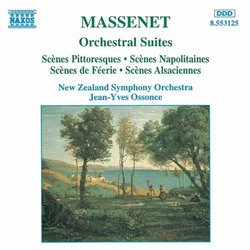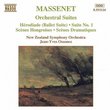Good Tunes + Great Orchestration = A Winning Disc
Micromegas | Ada, OK | 06/15/2007
(5 out of 5 stars)
"It's rare that so-called "light" music has strong lyricism, careful construction, and impeccable orchestration; but this is certainly the case in Massenet's 7 Orchestral Suites. Each one is a delight, extremely memorable even on a first hearing, but offering up fresh delights with each subsequent airing. Ossonce breaks them up over two discs, filling out the first with the ballet music to Herodiade. He is the perfect conductor for this music, which demands to be played colorfully, assertively, and without any false pretenses. He makes you believe in this music, and though I have heard another recording of Suites 4 and 7, this is definitely the one to buy.
This disc covers suites 4-7, which are slightly more mature and concise than the previous ones, though they are all cut from the same cloth. These are all character sketches, somewhat picture postcard, and highly theatrical. This is certainly the case in the Scenes napolitanies, Suite No.5, which captures the vivacity and exoticism of Naples as viewed by a foreign student (I believed Massenet traveled there in his youth). Suite No.6, Scenes de feerie, sounds a lot like his Suite No.3, Scenes Dramatiques (on Disc 1), which was drawn from incidental music from productions of Shakespeare's plays. Here, though the only explicit content is "fairyland," he conjures a bold, magical world that could complement A Midsummer Night's Dream, A Winter's Tale, or The Tempest. Particularly interesting is the movement "Apparition," which shows his mastery of orchestral color.
The two mastepieces are Suites 4 and 7, Scenes pittoresques and Scenes alsaciennes respecitvely. In Suite No.4, Massenet offers us his most original melodies, clothed in orchestration that, like Tchaikovsky or Ravel, makes every note "sound." The deicious cello melody in "Air de ballet" says it all. This is a naive and untroubled world, but a world well worth inhabiting for an hour or so. We get much of the same, yet with more sentiment in Suite No.7, which begins playfully in the "Dimanche matin," only to become boisterously comic in "Au cabaret." The highlight is the incredibly beautiful (and the best melody in the suites) "Sous les tilleuls," which evokes a still, tranquil moment "under the lime trees." The suite ends with the tour de force, "Dimanche soir," bringing our tour of Alsace to a rewarding conclusion.
These suites are not second rate, though make no pretensions to the kind of symphonic range of Tchaikovsky's Orchestral Suites. They fall more in the category of opera suites, similar to Bizet's l'arlesienne suites, or the works of Chabrier. They are works of life, love, and happiness, and they will undoubtedly bring you joy when they are performed with such gusto as in these fine recordings."
Simply great
Jacey Kay | Jersey | 11/01/2008
(4 out of 5 stars)
"ordered this item because i took a music class for college and had to do a listening for him. this CD really shows massenet's style. its calming. helps me fall asleep at night."
Engaging and delectable music in fine performances
G.D. | Norway | 12/21/2009
(4 out of 5 stars)
"This is really delightful music and a rather important addition to the catalogue. The suites do, admittedly, exist in alternative performances under Gardiner, which I haven't heard, but I don't think anyone will be disappointed with the spirited and colorful performances provided by the New Zealand Symphony Orchestra under the direction of Jean.Yves Ossonce. I am not going to claim that you'll find any masterpieces here - in fact, the orchestral suites are rather evidence that Massenet's claim to excellence lies firmly with his operas - but these are still brilliant, tuneful scores that are guaranteed to cheer you up and engage. Stylistically they leave one with no doubt about the identity of the composer (and remind me that I should recommend the reader to check out Lalo's atmospheric music for his ballet Namouna).
The music is strongest in the slower movements where Massenet is able to conjure up a marvelous range of color and atmosphere, but overall the music is inventive and varied and often inspired (among the highlights when it comes to individual movements are the Apparitions from the Scenes de féerie and some of the solo playing in the Scenes alsaciennes; as a whole the Scenes napolitaines are the less interesting ones). As mentioned, the performances are spirited and colorful, but they could perhaps have benefited from somewhat snappier rhythms and a little more lilt and grace. The recordings are spacious and clear, and both this and its companion disc can be firmly recommended."


 Track Listings (15) - Disc #1
Track Listings (15) - Disc #1
![Canadian Portraits: Murray Adaskin [Canada]](https://nationalbookswap.com/cd//m/40/0540/1030540.jpg)